一、概述
在AR眼镜开发中,设备连接是构建完整交互体验的基础环节。Rokid通过其CXR_M SDK提供了完整的蓝牙和Wi-Fi连接解决方案,本文将深入解析其实现原理和代码架构。
1.1 连接架构总览
Rokid设备连接采用分层设计:
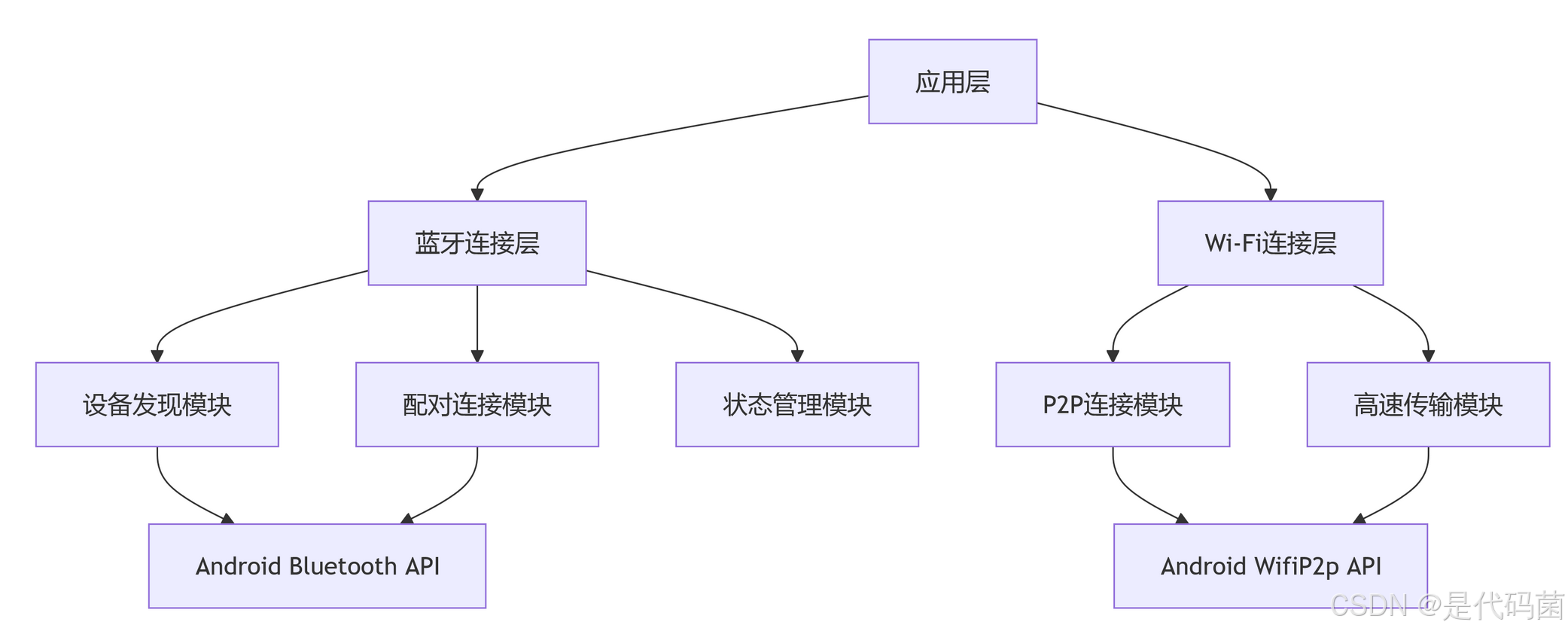
二、蓝牙连接实现详解
2.1 设备发现机制
设备发现是整个连接流程的起点,Rokid通过标准的Android Bluetooth API进行设备扫描,同时使用特定UUID过滤Rokid设备。
2.1.1 权限管理
kotlin
class BluetoothHelper(
val context: AppCompatActivity,
val initStatus: (INIT_STATUS) -> Unit,
val deviceFound: () -> Unit) {
companion object {
// 权限定义
private val REQUIRED_PERMISSIONS = mutableListOf(
Manifest.permission.ACCESS_FINE_LOCATION,
Manifest.permission.BLUETOOTH,
Manifest.permission.BLUETOOTH_ADMIN,
).apply {
if (Build.VERSION.SDK_INT >= Build.VERSION_CODES.S) {
add(Manifest.permission.BLUETOOTH_SCAN)
add(Manifest.permission.BLUETOOTH_CONNECT)
}
}.toTypedArray()
}
// 权限检查入口
fun checkPermissions() {
initStatus.invoke(INIT_STATUS.NotStart)
context.requestPermissions(REQUIRED_PERMISSIONS, REQUEST_CODE_PERMISSIONS)
context.registerReceiver(
bluetoothStateListener,
IntentFilter(BluetoothAdapter.ACTION_STATE_CHANGED)
)
}}权限管理流程:
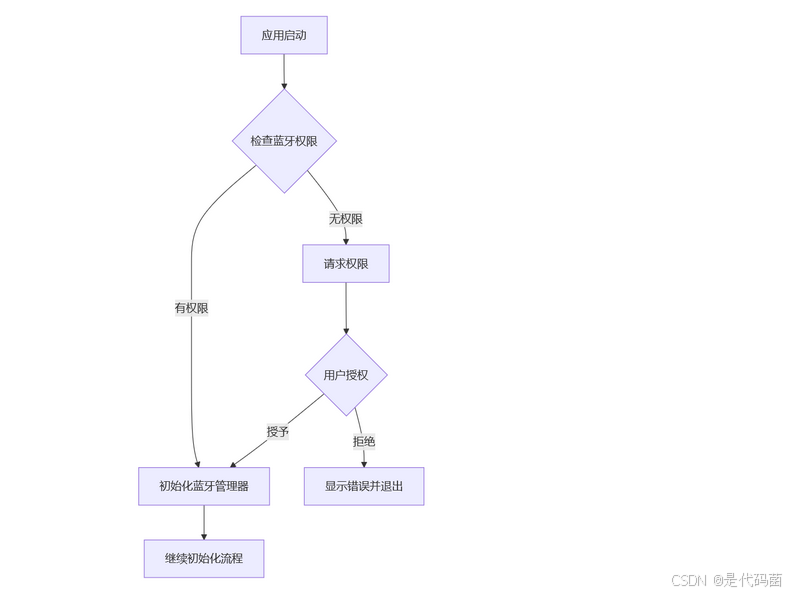
2.1.2 设备扫描实现
kotlin
// 开始扫描@SuppressLint("MissingPermission")@RequiresPermission(Manifest.permission.BLUETOOTH_SCAN)fun startScan() {
scanResultMap.clear()
// 获取已连接设备
val connectedList = getConnectedDevices()
for (device in connectedList) {
device.name?.let {
if (it.contains("Glasses", false)) {
bondedDeviceMap[it] = device
deviceFound.invoke()
}
}
}
// 获取已配对设备
adapter?.bondedDevices?.forEach { d ->
d.name?.let {
if (it.contains("Glasses", false)) {
if (bondedDeviceMap[it] == null) {
bondedDeviceMap[it] = d
}
}
deviceFound.invoke()
}
}
// 开始BLE扫描
try {
scanner.startScan(
listOf<ScanFilter>(
ScanFilter.Builder()
.setServiceUuid(ParcelUuid.fromString("00009100-0000-1000-8000-00805f9b34fb"))
.build()
), ScanSettings.Builder().build(),
scanListener
)
} catch (e: Exception) {
Toast.makeText(context, "Scan Failed ${e.message}", Toast.LENGTH_SHORT).show()
}}2.2 蓝牙初始化与连接
2.2.1 初始化流程
kotlin
/**
Init Bluetooth
*/fun initDevice(context: Context, device: BluetoothDevice){
CxrApi.getInstance().initBluetooth(context, device, object : BluetoothStatusCallback{
override fun onConnectionInfo(
socketUuid: String?,
macAddress: String?,
rokidAccount: String?,
glassesType: Int
) {
socketUuid?.let { uuid ->
macAddress?.let { address->
connect(context, uuid, address)
}?:run {
Log.e(TAG, "macAddress is null")
}
}?:run{
Log.e(TAG, "socketUuid is null")
}
}
override fun onConnected() {
// 连接成功处理
}
override fun onDisconnected() {
// 连接断开处理
}
override fun onFailed(p0: ValueUtil.CxrBluetoothErrorCode?) {
// 错误处理
}
})}2.2.2 连接建立
kotlin
/**
Connect Bluetooth
*/fun connect(context: Context, socketUuid: String, macAddress: String){
CxrApi.getInstance().connectBluetooth(context, socketUuid, macAddress, object : BluetoothStatusCallback{
override fun onConnectionInfo(
socketUuid: String?,
macAddress: String?,
rokidAccount: String?,
glassesType: Int
) {
// 连接信息更新
}
override fun onConnected() {
Log.d(TAG, "Connected")
}
override fun onDisconnected() {
Log.d(TAG, "Disconnected")
}
override fun onFailed(p0: ValueUtil.CxrBluetoothErrorCode?) {
Log.e(TAG, "Failed")
}
})}蓝牙连接状态机:
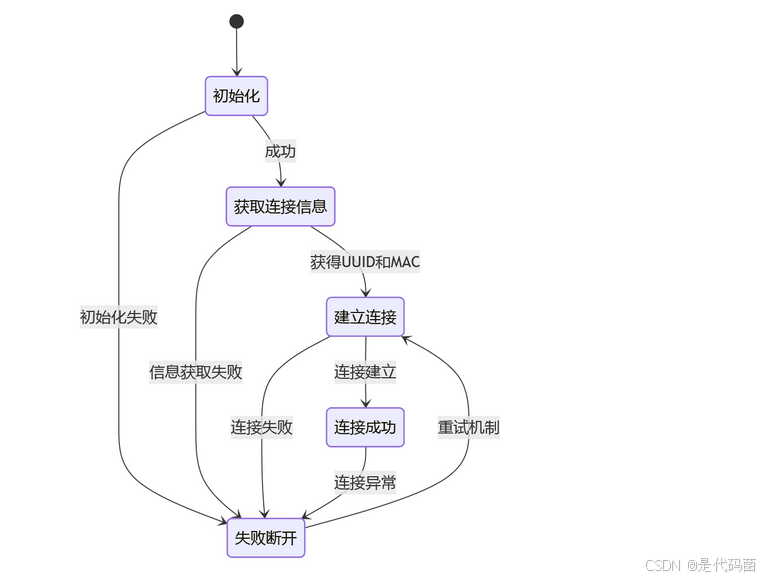
2.3 连接状态管理
2.3.1 状态查询
kotlin
/**
Get Connection Status
*/fun getConnectionStatus(): Boolean{
return CxrApi.getInstance().isBluetoothConnected}
2.3.2 状态监听
// Bluetooth State Listenerval bluetoothStateListener = object : BroadcastReceiver() {
override fun onReceive(context: Context?, intent: Intent?) {
val action = intent?.action
if (action == BluetoothAdapter.ACTION_STATE_CHANGED) {
val state = intent.getIntExtra(BluetoothAdapter.EXTRA_STATE, BluetoothAdapter.ERROR)
when (state) {
BluetoothAdapter.STATE_OFF -> {
initStatus.invoke(INIT_STATUS.NotStart)
bluetoothEnabled.postValue(false)
}
}
}
}}2.4 资源管理与重连机制
2.4.1 资源释放
kotlin
/**
DeInit Bluetooth
*/fun deInit(){
CxrApi.getInstance().deinitBluetooth()}
// Release@SuppressLint("MissingPermission")fun release() {
context.unregisterReceiver(bluetoothStateListener)
stopScan()
permissionResult.postValue(false)
bluetoothEnabled.postValue(false)}2.4.2 重连机制
重连使用与初始连接相同的API,但需要保存之前的连接参数:
kotlin
/**
重连实现
*/fun reconnect(context: Context, savedSocketUuid: String, savedMacAddress: String) {
connect(context, savedSocketUuid, savedMacAddress)}三、Wi-Fi连接实现详解
Wi-Fi连接建立在蓝牙连接基础之上,主要用于高速数据传输。由于Wi-Fi模块功耗较高,建议仅在需要传输大量数据时开启。
3.1 Wi-Fi初始化
3.1.1 初始化流程
kotlin
/**
Init Wifi
*/fun initWifi(): ValueUtil.CxrStatus?{
return CxrApi.getInstance().initWifiP2P(object : WifiP2PStatusCallback{
override fun onConnected() {
Log.d(TAG, "onConnected")
}
override fun onDisconnected() {
Log.d(TAG, "onDisconnected")
}
override fun onFailed(errorCode: ValueUtil.CxrWifiErrorCode?) {
// 错误处理
}
})}Wi-Fi连接状态图:

3.2 Wi-Fi状态管理
3.2.1 连接状态查询
kotlin
/**
Get Wifi Connection Status
*/fun getWiFiConnectionStatus(): Boolean{
return CxrApi.getInstance().isWifiP2PConnected}3.2.2 资源释放
kotlin
/**
Deinit Wifi
*/private fun deinitWifi(){
CxrApi.getInstance().deinitWifiP2P()}四、完整连接流程与最佳实践
4.1 完整连接时序图
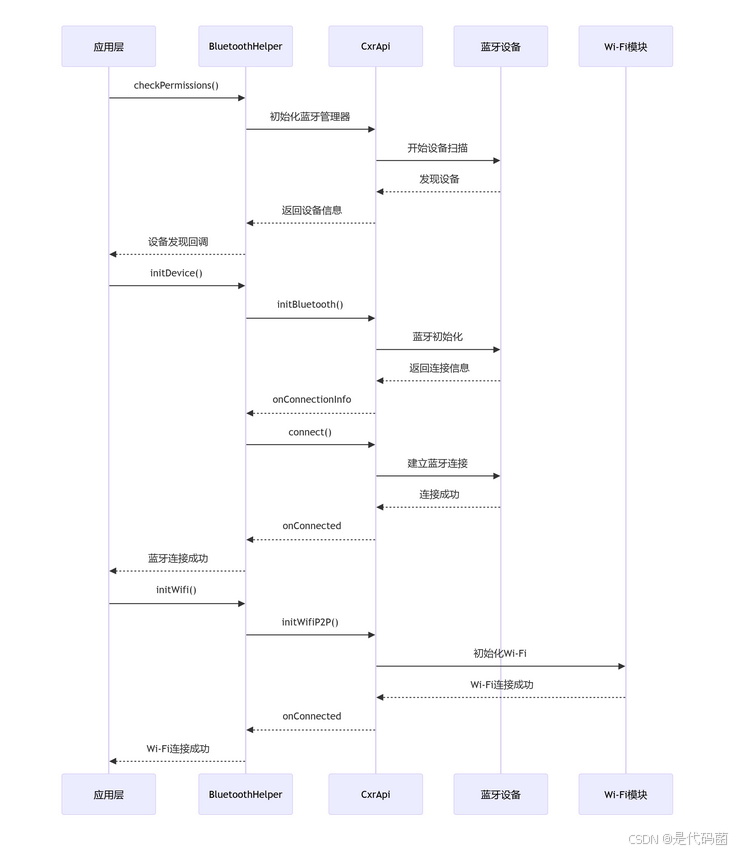
4.2 错误处理策略
4.2.1 蓝牙错误处理
kotlin
override fun onFailed(errorCode: ValueUtil.CxrBluetoothErrorCode?) {
when (errorCode) {
ValueUtil.CxrBluetoothErrorCode.PARAM_INVALID -> {
Log.e(TAG, "Invalid parameters provided")
}
ValueUtil.CxrBluetoothErrorCode.BLE_CONNECT_FAILED -> {
Log.e(TAG, "BLE connection failed")
}
ValueUtil.CxrBluetoothErrorCode.SOCKET_CONNECT_FAILED -> {
Log.e(TAG, "Socket connection failed")
}
ValueUtil.CxrBluetoothErrorCode.UNKNOWN -> {
Log.e(TAG, "Unknown bluetooth error")
}
else -> {
Log.e(TAG, "Unhandled error code: $errorCode")
}
}}4.2.2 连接重试机制
建议实现指数退避的重试机制:
kotlin
class ConnectionManager {
private var retryCount = 0
private val maxRetries = 3
private val baseDelay = 1000L // 1秒
fun connectWithRetry(context: Context, socketUuid: String, macAddress: String) {
connect(context, socketUuid, macAddress, object : BluetoothStatusCallback {
override fun onFailed(errorCode: ValueUtil.CxrBluetoothErrorCode?) {
if (retryCount < maxRetries) {
retryCount++
val delay = baseDelay * (2 pow retryCount) // 指数退避
Handler(Looper.getMainLooper()).postDelayed({
connectWithRetry(context, socketUuid, macAddress)
}, delay)
} else {
notifyConnectionFailed()
}
}
override fun onConnected() {
retryCount = 0
}
})
}}4.3 性能优化建议
连接策略对比:
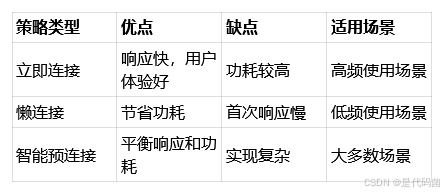
五、总结
Rokid CXR_M SDK提供了完整的设备连接解决方案,通过清晰的API设计和回调机制,让开发者能够快速实现蓝牙和Wi-Fi连接功能。